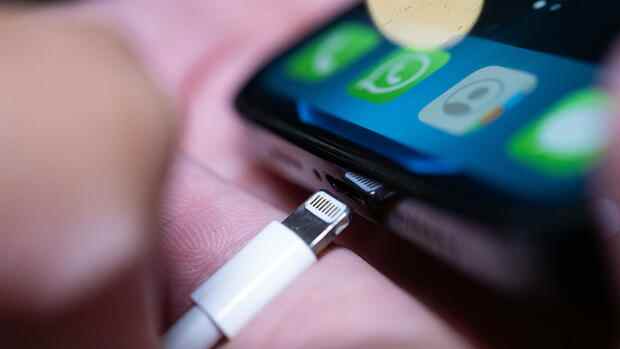The question of chargers has occupied the EU institutions for more than a decade.
(Photo: dpa)
Strasbourg The EU Parliament has given its final approval for the uniform USB-C charging standard for smartphones and many other devices. On Tuesday, MEPs voted almost unanimously for a regulation previously found by negotiators from Parliament and the EU states.
Accordingly, the new requirements will come into force in 2024. In a last step, the EU states still have to agree, which is scheduled for October 24th. But this is considered a formality.
Legal requirements have long been the subject of debate. More than ten years ago, the commission brought the charging cable issue up for the first time. 14 manufacturers – including Apple – agreed to a uniform standard for mobile phone power supplies in a voluntary commitment. When it comes to the sockets in smartphones and tablet computers, there are only three of the dozen types left: USB-C, Apple’s Lightning connector and micro-USB.
The result is celebrated by representatives of various parties. Andreas Schwab (CDU), spokesman for the EPP Group on internal market policy, points out that it is also becoming easier to switch from one manufacturer to another. However, remaining stocks of other charging cables are likely to be sold later. His SPD colleague René Repasi also welcomed the fact that the EU Commission should present a uniform standard for wireless charging.
Top jobs of the day
Find the best jobs now and
be notified by email.
The software, IT and digital industry association Bitkom, on the other hand, has expressed vehement criticism. The project runs counter to the principle of openness to technology, it said. “Innovations such as loading times or data transmission are being politically slowed down,” said Bitkom CEO Bernhard Rohleder.
In addition to mobile phones, numerous other devices are subject to the new rules
Green MP Anna Cavazzini disagrees. “Contrary to what some lobbyists claim, the agreement on the uniform charging cable is open to innovation.” Should there be a better connection in the future, USB-C could be replaced – but only by a new uniform standard.
But there are also company representatives who are happy about the new rules. “Uniform charging cables stop annoying cable clutter, save resources and consumers’ nerves,” said the association of municipal companies. The association represents, among other things, the interests of waste management.
Inside Valley: This is what Apple does with old iPhones
In addition to mobile phones, numerous other devices are now also subject to the new rules. These include tablets, digital cameras, headphones, speakers, e-readers, keyboards and mice. The rules will apply to laptops from spring 2026. According to the EU Parliament, the new guidelines should result in consumers in the EU saving 250 million euros per year because unnecessary charger purchases would be avoided.
In addition, in the future it should already be clear when purchasing whether a device is being sold with or without a charging cable. In addition, special labels should make it easier to determine whether existing chargers are compatible with the end device. “This also enables the purchasing public to make a well-founded decision as to whether it is necessary to buy a new charger with a new device,” said the EU Parliament.
More: EU Parliament wants to ban laptops and cell phones without USB-C
